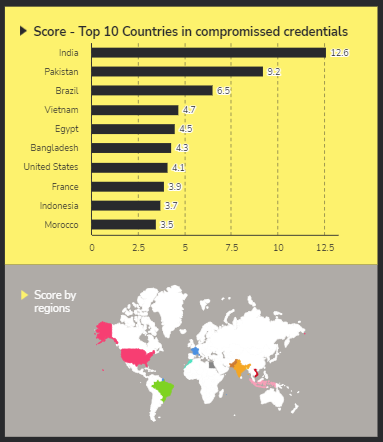Data Breaches: A Growing Threat

Reading Time: 2 Minutes
Introduction
Data breaches represent an increasingly serious problem for businesses and individuals around the world. In 2023 there were more than 18.6 billion records exposed in 2023, a 42% increase compared to 2022, which exposed sensitive information of millions of people, the increase is significant and could double in 2024.
Recently, a massive data leak was discovered containing 12 terabytes of information obtaining more than 26 billion records, the same count of information and data from users of LinkedIn, X (Twitter), Telegram, recent among others, is certainly the largest data leak in history.

Below you can see the top 10 ranking, including the number of accounts leaked by each country in 2023:
- India: 12.6Kleaked accounts
- Pakistan: 9.2K leaked accounts
- Brazil: 6.5K leaked accounts
- Vietnam: 4.7Kleaked accounts
- Egypt: 4.5Kleaked accounts
- Bangladesh: 4.3Kleaked accounts
- United States: 4.1Kleaked accounts
- France: 3.9Kleaked accounts
- Indonesia: 3.7Kleaked accounts
- Morocco: 3.5K leaked accounts
What is a data breach?
A data leak occurs when sensitive information is accessed, used, or disclosed without authorization. This can happen through a variety of mechanisms, such as cyberattacks, security breaches, or human error.
What are the types of data that can be leaked?
The types of data that can be leaked are diverse, including:
- Personal data: such as name, address, telephone number, ID number and date of birth.
- Financial data: such as credit card numbers, bank accounts, and transaction history.
- Health data: such as medical records, test results, and hospitalization history.
- Corporate data: such as trade secrets, customer information, and intellectual property.
See Also: So you want to be a hacker?
Offensive Security and Ethical Hacking Course
What are the impacts of a data breach?
The impacts of a data breach can be severe for businesses and individuals, including:
- Identity theft: The leaked data can be used to commit fraud, such as opening accounts in the victim’s name.
- Financial damage: Victims may suffer financial losses as a result of fraud or theft.
- Reputational damage: Companies can have their image and reputation damaged as a result of a data breach.
- Loss of customers: Customers may lose trust in a company that has had their data leaked.
- Legal sanctions: Companies can be fined by regulatory bodies if they fail to comply with data protection laws.
The Top Data Leaks in 2024 (so far):
- Attack on Microsoft: In January, a hacking group called Lapsus$ broke into Microsoft and stole the source code of several products, including Windows and Bing. The attack was considered one of the largest in the company’s history.
- T-Mobile breach: In February, phone carrier T-Mobile suffered a breach that exposed the personal data of more than 50 million customers.
Other notable leaks:
- Attack on the Australian government: In February, data on more than 38 million Australian citizens was exposed in a cyberattack.
- Healthcare company Medibank breach: In October, Australian healthcare company Medibank fell victim to a ransomware attack that exposed the data of more than 9.7 million customers.
This list just highlights some of the major data breaches that have occurred so far in 2024.
What to do in case of a data breach?
If you believe your data has been leaked, it’s important to take a few steps:
- Monitor your bank accounts and credit cards: Keep an eye out for any suspicious activity and immediately notify your bank or credit card company.
- Change your passwords: Change the passwords for all your online accounts, especially those that use the same password.
- Notify the authorities: File a police report at the police station.
- Seek legal advice: If you suffer financial damage or other losses as a result of a data breach, you may be entitled to compensation.
- Data privacy regulations, such as GDPR in Europe, impose strict requirements to protect citizens’ personal data. Maintaining compliance with these regulations can be challenging for organizations.
How to protect yourself from data leaks?
There are a few steps you can take to protect yourself from data leaks:
- Use strong and unique passwords: Use different passwords for each online account, and avoid using personal information such as name or date of birth.
- Enable multi-factor authentication: This measure adds an extra layer of security to your online accounts by requiring you to provide an additional code in addition to your password to sign in.
- Keep your software up-to-date: Install the latest security updates for your operating systems and applications.
- Be careful about the emails and links you click: Avoid clicking on links or opening attachments from emails from unknown senders.
- Back up your data: Regularly back up your important data so that you can restore it in the event of a data breach.
Tips for businesses:
- Implement a data security policy: Establish rules and procedures to protect the company’s data.
- Train your employees: Educate your employees on cybersecurity risks and how to protect company data.
- Invest in security measures: Utilize tools and technologies to protect the company’s data from cyberattacks.
- Have an incident response plan: Define the measures that will be taken in the event of a data breach.
By taking the necessary precautionary measures, you can protect your data and minimize risks.
What to expect until the end of the year?
It’s hard to predict with certainty what will happen in the future, but it’s possible that we’ll see more data leaks in 2024. Cyberattacks are becoming increasingly sophisticated, and businesses and individuals need to be constantly vigilant to protect their data.
Some of the key trends that could lead to more data breaches in 2024 include:
- Increased remote work: With more people working remotely, the attack surface for cybercriminals has expanded.
- Increased cloud usage: Migrating to the cloud can increase the risk of data leaks if businesses do not take the proper security measures.
- Increased use of artificial intelligence (AI): AI can be used by cybercriminals to automate attacks and make them harder to detect.
To check if your or your company’s data has been leaked:
haveibeenpwned.com or cybernews.com/personal-data-leak-check
This article is written by Geovane da Costa Oliveira
Are u a security researcher? Or a company that writes articles about Cyber Security, Offensive Security (related to Information Security in general) that match with our specific audience and is worth sharing? If you want to express your idea in an article contact us here for a quote: [email protected]


















